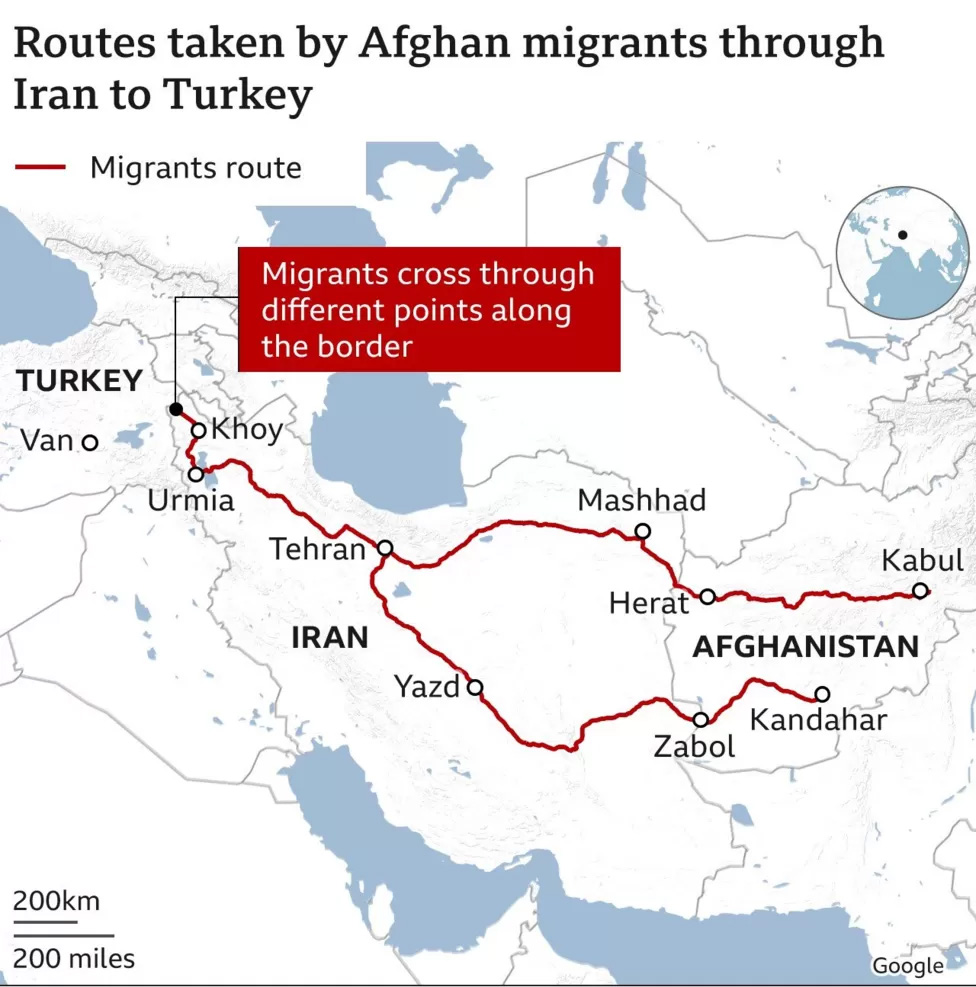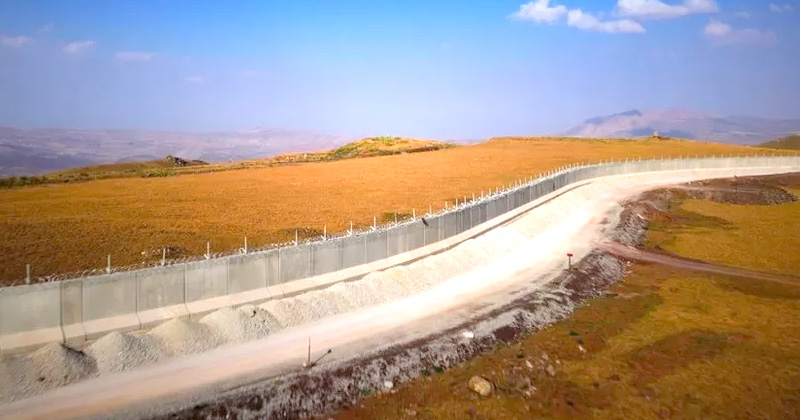As they seek refuge in Europe, Afghan individuals escaping the Taliban encounter the distressing reality of being abducted and subjected to torture by criminal gangs during their border crossing from Iran to Turkey. These gangs exacerbate the situation by sending videos of the victims' abuse to their families, leveraging their captivity to demand ransom payments for their safe release.
On a mountaintop, bound together and restrained by padlocks fastened around their necks, a distressed group of Afghan migrants pleads desperately for their freedom.
In a video testimony, a man with a bloodied lip and a face covered in dust appeals to anyone watching, disclosing the details of their kidnapping the previous day. The abductors demand a ransom of $4,000 (£3,200) for each person held captive. The victims recount enduring relentless physical abuse, enduring beatings that continued ceaselessly, both day and night. Another distressing video captures a scene where a group of men, stripped, crawls through the snow while enduring the harsh lashing of a whip from behind.
These unsettling videos serve as proof of an expanding illicit operation where gangs in Iran target predominantly Afghan migrants who are attempting to reach Europe. The established path of migration from Afghanistan through Iran, crossing the border into Turkey, and onwards to the rest of Europe has been utilized for many years. In fact, I personally undertook a portion of this very journey 12 years ago when I fled Iran seeking asylum in the UK, where it was eventually granted.
However, the current state of the route has become increasingly perilous compared to previous times.
In another heart-wrenching plea, a man breaks down, emphasizing his familial ties and pleading for mercy. He tearfully mentions his wife and children, beseeching their captors for compassion. Regrettably, the scene quickly shifts, capturing the moment when one of the gangs subjects him to knife-point abuse, all of which is painfully documented on film.
 Individuals attempting to cross the border from Iran into Turkey are compelled to endure extensive walks across arid, mountainous landscapes devoid of trees that could offer shelter. This challenging terrain exacerbates their predicament, making it more difficult to evade the watchful eyes of security forces patrolling the region.
Individuals attempting to cross the border from Iran into Turkey are compelled to endure extensive walks across arid, mountainous landscapes devoid of trees that could offer shelter. This challenging terrain exacerbates their predicament, making it more difficult to evade the watchful eyes of security forces patrolling the region.
Since the Taliban assumed control in Afghanistan in August 2021, an immense wave of people has sought refuge by fleeing the country. Exploiting this surge in migration, criminal gangs have identified an opportunity to capitalize on the situation. In collaboration with human smugglers, these gangs have resorted to abducting individuals on the Iranian side of the border, coercing vulnerable groups who have often already paid substantial sums to secure safe passage, into providing further monetary ransom.
One activist, who has dedicated the past three years to documenting the instances of abuse, shared with us the staggering number of torture videos he received at the height of the crisis - sometimes as many as two or three per day.
In an apartment located in Istanbul, the bustling commercial capital of Turkey, we are introduced to Amina. Amina had enjoyed a successful career as a police officer in Afghanistan but was compelled to flee the country upon realizing that the Taliban would regain power, having previously received threats from the group.
Soft-spoken and adorned in a purple headscarf, she recounted her harrowing experience at the border when she and her family were taken captive by a gang. "I was overcome with fear and terror, particularly because I was pregnant and lacked access to medical care.
Amina's father, Haji, revealed that the gang sent him a video showcasing the torture of an unidentified Afghan man after they had kidnapped Amina and other members of their family. "This was the predicament I found myself in. By transmitting these videos, they were issuing a warning. If we failed to pay the ransom, they would kill my daughters and son-in-law," he lamented.
To secure the release of his family, Haji was compelled to sell their house in Afghanistan and provide the proceeds to the gang. They made another attempt to enter Turkey, which proved successful this time. However, the eight-day ordeal at the border had taken a significant toll on Amina. Tragically, she lost her baby.
In addition to the threats posed by the criminal gangs, Amina and others face yet another formidable obstacle along their journey: The imposing wall. Stretching over half the length of the Turkish-Iranian border, this barrier stands at a height of three meters and is reinforced with barbed wire and electronic sensors. The watchtowers, funded by the European Union (EU), further fortify its security.
The construction of the wall in Turkey began in 2017 with the aim of preventing the influx of migrants into the country. However, despite these efforts, migrants continue to arrive.
Amina and several others shared their experiences of falling into the hands of violent gangs on the Iranian side after being forcibly pushed back over the border by Turkish authorities during the night. These allegations have been substantiated by international human rights organizations.
Mahmut Kagan, a Turkish human rights lawyer representing asylum seekers, asserts that such illegal practices, in violation of international law, contribute to the exploitation of individuals by criminal gangs. He emphasizes that these pushbacks create a vulnerable group that is susceptible to various forms of abuse.
However, in the face of similar accusations from human rights groups, the government has consistently denied engaging in pushbacks. They maintain that any measures taken to prevent illegal entry into Turkey fall under the purview of border management.

With the construction of the wall, the once-thriving trade of smuggling goods across the border, which provided a livelihood for many locals, has largely disappeared. Consequently, some individuals have resorted to alternative activities such as kidnapping or trafficking migrants.
In Van, the Turkish city closest to the Iranian border and a central hub for migrant trafficking, we encountered Ahmed, a young Afghan man. He had sought refuge in a stable that had been repurposed as a safehouse while negotiating the next stage of his journey with smugglers.
Ahmed recounted the distressing tale of his brother's abduction on the Iranian side of the border along with their extended family when they attempted to escape the Taliban's clutches last year. As the only one still in Afghanistan, Ahmed received the harrowing phone calls from the gang, demanding a ransom.
"I pleaded with them, explaining that we didn't have the money. Meanwhile, the kidnapper was physically assaulting my brother, and we could hear the agonizing sounds down the line," he revealed.
In order to secure the release of his family, Ahmed resorted to selling their possessions. However, this challenging experience did not deter him from embarking on the same journey himself six months later. He was driven by desperation to seek better opportunities after the economic crisis that ensued following the Taliban's assumption of power.
In Kabul, the capital of Afghanistan, we encountered Said, who had returned to his starting point after six unsuccessful attempts to flee Afghanistan and reach Turkey. He had been promised a forged document that would facilitate his passage to Turkey. However, he found himself deceived by his contact and sold to a criminal gang. The gang subjected him to torture and demanded a ransom of $10,000 (£7,990).
"I was consumed by fear. They had the power to inflict any form of harm on me. They could blind me, sell my kidneys, or even extract my heart," he recounted. What terrified him the most, though, was the potential loss of his dignity. He overheard the gang discussing their intentions to rape him and send the video to his family back in Afghanistan. After paying a sum of $500 (£400), he eventually managed to escape his captors.
Based on the investigative report by BBC